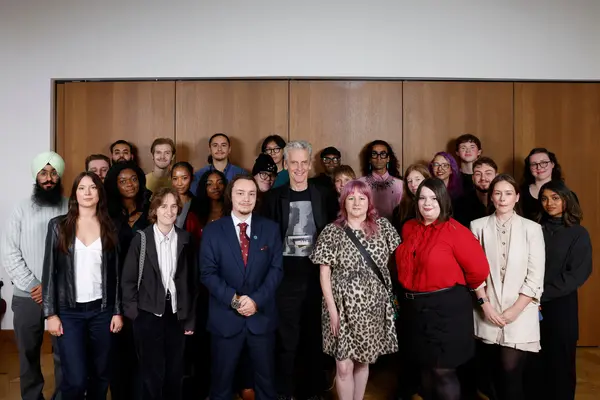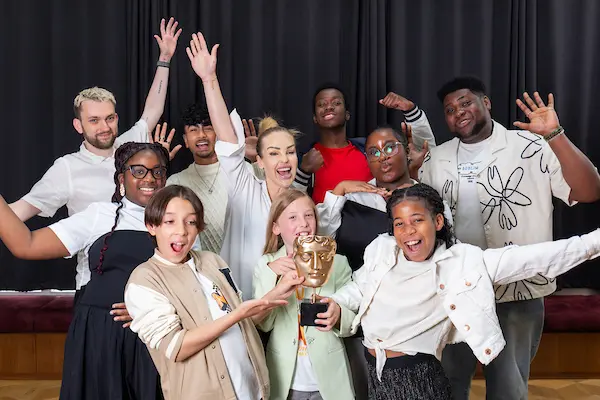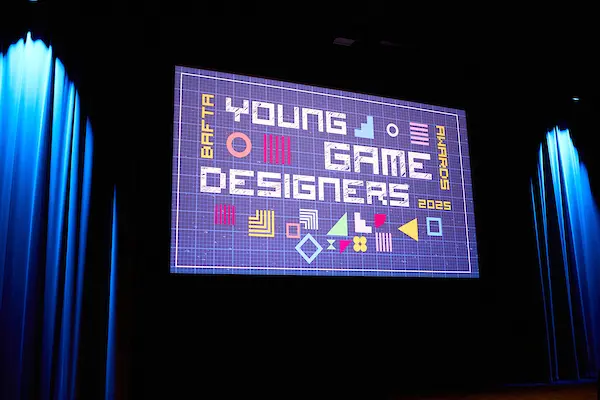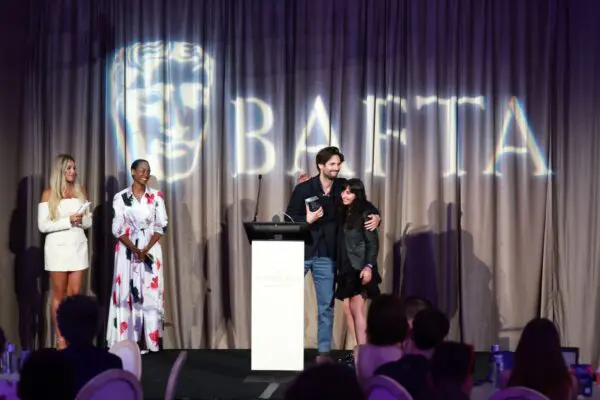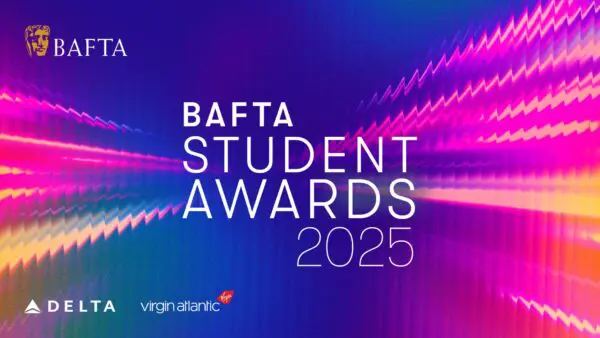For decades, the needs of deaf, disabled and neurodivergent (DDN) people have not been considered by the creative industries, leading to a rich and diverse pool of talent – and a huge section of society – largely being excluded. But things are changing, and BAFTA is leading by example.
BAFTA Trustee Andrew Miller, one of the first disabled presenters on British TV, remembers his first visit to 195 Piccadilly, BAFTA’s headquarters, with horror. It was the 1990s and he was at the height of his broadcasting career, presenting the breakthrough children’s show Boom! for Channel 4.
“The whole visit was an entirely miserable experience. I discovered the lift was only accessible by several steps …I had to be carried up to reach the lift, and when I got to where I was going there was no accessible loo. As a wheelchair user that kind of summed it up for me; that physical inaccessibility signalled that BAFTA wasn’t for the likes of me.
“Fast forward to March this year, I arrived in this smart, glamorous, fully accessible building with not just one but two lifts, no steps, disabled loos on every floor, large open spaces that were really easy for me to navigate… It just felt terrific. I suddenly felt embraced and part of the place.”
In the UK, more than one in five people are DDN. But DDN people are severely under-represented in many sectors, including the creative industries. A key contributing factor to this is that accessibility isn’t always considered from the very start of a project, which continues to inhibit DDN people’s access to venues, sets, production offices and other spaces across the industry.
The fact that 195 Piccadilly is now fully accessible, following a near decade-long renovation project that finished this year, sends a powerful message about the need to recognise and cater for DDN people. It is one of many changes BAFTA has made over the last few years in what has been a fundamental shift in the organisation’s ethos and operations.
Access and Ableism
For Andrew, who became a BAFTA board member in 2021, the issues DDN people experience come down to access and ableism – the latter of which he defines as “the behaviour that favours non-disabled people, which therefore discriminates against disabled people.”
He adds: “It applies to a wide range of situations and settings, from not considering physical access to not understanding the support that deaf, disabled, neurodivergent and learning disabled people need to succeed. Ableism also acts as a sort of conditioning agent that inhibits disabled people’s ambitions and non-disabled people’s expectations of what we can do. It wrecks opportunities for disabled people, just as surely as racism, sexism, ageism and homophobia do.
“Historically, disabled people have been expected to fit in to inaccessible systems and environments that required us to be super adaptive, resourceful and willing to make significant personal adjustments just to fit in. And these have acted as massive barriers that prevented disabled people from pursuing careers in the creative industries.”
There are huge benefits to anticipating and planning for accessibility before a production begins. Most importantly, it means everyone working on the production is free to concentrate on doing their job. And if accessibility, in all senses of the word, is budgeted for from the start, it is also easier and cheaper to implement. This can avoid countless frustrating situations, such as captions not being thought about in advance then productions running out of money by the time they are considered.
“Access has a positive impact on everyone,” says Sam Tatlow, chair of BAFTA’s Disability Advisory Group and Creative Diversity Partner at ITV. “If you need a ramp on set for a wheelchair user that ramp will be used by them, but it will also be used by the camera team, who’ll use it to move the cameras, the props, the grips…By not thinking about access you’re actually making everyone’s life more difficult.”
Sam says she appreciates that non-DDN people who have not worked with DDN people before might feel unsure about how to approach things. Her advice is to lean into it: “Start talking about it. If you don’t know, ask a question. Engage in those conversations, because the more you lean into it, the more you realise that a lot of the things are very simple and not expensive to do, and you’ll get a much more creative and inclusive team out of it.”
On the flip side, the consequences of not considering accessibility are significant.
“First off, you probably won’t see disabled people in inaccessible spaces,” says Sam. “And if we are there, we’re not able to do our best work, so either the project fails, and fails badly,… or [people might] do some really quite serious things to themselves to make things work. If there’s not an accessible toilet, they might restrict how much liquid they take in so they don’t need to go to the loo, or they might not communicate with the team because they can’t bring in an interpreter… The impact, mentally and physically, on individuals is actually quite huge.”
A watershed moment
BAFTA has undergone a significant cultural shift to come to a place where it now considers accessibility and inclusion for DDN people and other under-represented groups in all its projects and initiatives.
BAFTA’s journey to get to this point began relatively recently. In 2018, a review carried out by ThinkBIGGER made specific recommendations on broadening access for DDN people. But it was in 2020 that things really accelerated when BAFTA announced wide-ranging changes to its voting, membership and processes as part of its 2020 Review. This was followed by further consultations with ThinkBIGGER and TripleC, a community-led organisation representing DDN people in the arts and media. It was a watershed moment.
“BAFTA placed themselves in a position of ‘we are opening our doors and we are listening’,” says Sam. “And because they came into it with that intention people felt heard, and that then led to better results. It has genuinely been transformational, for the disability community and BAFTA. The fact that we’re all listening to each other, and that these relationships are continuing, has been one of the most brilliant things about it.”
As part of the review, BAFTA established the Disability Advisory Group, which Sam chairs. Most of the people who sit on the group are DDN creatives and there is representation from leading disability-led organisations, such as TripleC, Deaf and Disabled People in TV, BFI Disability Screen Advisory Group and Underlying Health Condition. The group feeds directly into BAFTA’s Board of Trustees, and members also sit on different BAFTA committees, meaning the group’s influence reaches far and wide.
Access coordinators
Of the many changes that BAFTA has introduced since 2020, a number stand out as being particularly significant for DDN people.
Making access coordinators available to the producers being supported through BAFTA Elevate is one such example. Access coordinators work in a similar way to intimacy coordinators; they are responsible for ensuring a space is accessible and safe for all those using it. This takes the pressure off individuals to push for accessibility and shifts the responsibility to where it should rightfully sit: the organisation employing those people.
“The more people get used to talking about access coordinators – and having that expectation that there are people who have that knowledge and that it is beneficial and useful for everyone to have this bespoke person as part of a team – it will increase their use,” says Sam. “The end goal, actually, is for there to be no accessibility coordinators. Because we all need to be better about thinking about it, talking about it, and knowing how to put things in place to support everyone.”
Industry signals
At the beginning of 2022, BAFTA brought in TripleC to partner in an ongoing consultation assessing the accessibility of its awards ceremonies and year-round events and initiatives.
In 2023, BAFTA’s annual Film Awards will move to the Royal Festival Hall. Although adjustments were in place to cater for DDN people attending previous Film Awards, the venue move, like the refurbishment of 195 Piccadilly, sends an important signal to the DDN community and has been well received as a result.
“The first thing that you think about when you think about the Film Awards is the red carpet,” says Sam. “And the first thing you saw [in previous years] was the red carpet going up some stairs into the venue. That just gave the message of inaccessibility. Say I’m an aspiring disabled filmmaker who uses a wheelchair or walks with crutches, I can never aspire to be at something like that because of the image I see.
“Making that change automatically transforms people’s understanding of what BAFTA is, what everybody is aiming towards, and also what I, as a disabled person, can see myself being a part of. The 2022 awards also had sign language interpreters on stage – it’s those visible representations of access and inclusion that are really important.”
Sam also remembers coming to 195 Piccadilly in the past, and says of its refurbishment: “I found it quite emotional…I’m a wheelchair user, and I remember the awkwardness of trying to use the old building…and now the space is so bright and open and feels welcoming.
“I recently used one of the spaces there for an ITV and Disney co-sponsored event called About Time, which showcased disabled talent in the industry…There were about 10 wheelchair users, maybe another 10 or so people with mobility impairments, and there were no issues…That just would not have been possible before.”
Supporting new talent
Andrew says he is “beyond delighted” to now see DDN representation in BAFTA’s key career development schemes, such as BAFTA Breakthrough and BAFTA Elevate.
“This is absolutely necessary for BAFTA to demonstrate leadership and influence with the wider industry and also to support the next generation [of DDN talent]. We saw that with the announcements of Rose Ayling-Ellis, Leon Harrop and others in the new cohort of BAFTA Breakthrough. This is signalling to the sector that this is how things should be – this is what diversity in action looks like.”
BAFTA is also making its membership more diverse. Alongside other initiatives, BAFTA offers an ongoing discount on membership fees for DDN people.
“Having more disabled members will influence the work that is nominated and wins, and that will shift the dial on representation” says Sam. “That, in turn, shifts the industry. By that work being celebrated, more people will…make work like that, and therefore more disabled people will get work and more diverse stories will be told.
“More disabled members also means more of the BAFTA membership being around and interacting with disabled people, which can only be a good thing – for the non-disabled and disabled members. The more you’re able to be around other disabled people, the more you feel like you’ve got a cohort of peers, and that’s really important. Quite often, you can feel like the only one.
“I’m a classic example of that. One of the first jobs that I interviewed for in the TV industry was on the phone and I didn’t tell them that I was a wheelchair user…But it was a real shock to them when I turned up. That first day was really awkward…I remember them having quiet, hushed conversations, people rushing in and out of meeting rooms…But it’s because I was the only one in that office, so they’d never experienced it before.”
A crucial part of making the BAFTA membership more representative is encouraging existing members to disclose disability on their membership record and in membership surveys. This will give the organisation a much clearer picture of its members’ needs, enabling it to plan more effectively.
“We know that the figure of 5% [the current proportion of BAFTA members who are DDN] is probably not accurate,” says Andrew. “But we also know that coming out as disabled, even in 2022, remains a challenge for some people. There is still stigma around acknowledging what is perceived by some to be a weakness, especially if you have an invisible disability… But there’s nothing weak about living with an impairment… in fact, it’s quite the opposite.”
Increasing visibility
With the many changes happening at BAFTA and across the wider sector, the dial on DDN representation may be starting to shift, but there is still a long way to go.
“Ours still remains quite an invisible history,” says Andrew. “I often give the example of how, in the 94 years of the American Academy Awards, 62 actors have received Oscar nominations for portraying deaf or disabled characters and 28 won, but only 3 were actually played by deaf or disabled actors.
“Just a handful of years ago, these figures would have been met with barely a shrug. Now they stand as an embarrassing indictment of the entire entertainment industry. And whilst making a compelling case for the need of authentic representation, the numbers also tell you just how central disability is, in all its forms, to human storytelling…From Tiresias and Oedipus to Isaac in Sex Education, disability actually sells. But it is rarely – and has only recently – been told through our lived experience.
“I now feel more hopeful about disabled talent being recognised, especially as BAFTA has put in place the mechanisms to ensure traditionally underrepresented groups are given a fair chance. We’re now beginning to see real and meaningful change that can sustain people’s careers, and that’s leading to things that I couldn’t have imagined when I was starting. Disabled narratives are being told on film and TV in a way we’ve never seen before.
“Documentaries like Crip Camp, some of the excellent work Channel 4 has been doing, mainstream presenters like Sophie Morgan and Ade Adepitan, the BAFTA-winning George Webster on CBeebies, films like CODA, When Barbara Met Alan. That’s really gratifying, and really critical, because it’s this that will make things sustainable in the long term.
“Fundamentally, people’s lived experience is more valued now that it certainly has ever been before…In fact, I’d go as far as to say that I don’t think there’s ever been a better time to be disabled and in the creative industries than now.”
Words by Hester Phillips.






